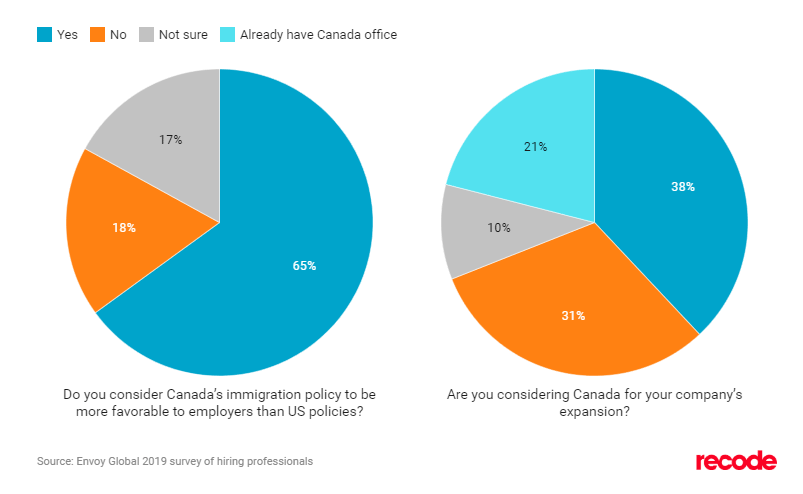
American companies are increasingly moving tech jobs to Canada, where easier immigration policies make it much easier to hire foreign tech workers than it is here in the U.S. where the Administration has taken steps to make it more difficult. That mean these companies are expanding their operations in Canada…especially in their tech divisions…turning certain Canadian cities into the next great tech hubs in North America.
See more on Canada’s growing tech impact…
With the United States economy operating at nearly full employment, and an aggressive immigration policy that is making it harder for the growing tech industry to obtain H-1B visas such that they can hire more foreign workers, companies are turning to our friends up north to fulfill their needs according to a report by Recode. H-1B visa recipients, the report says, “are all backed by US companies that say they are in need of specialized labor that isn’t readily available in the US – which, in practice, includes a lot of tech workers.”
But the US government has tightened down on visa approvals, and now is seeking to restrict immigration, both illegal and legal. Big tech in the US including companies like Amazon, Facebook, and Google have all been advocating for more generous immigration policies to allow them to attract more high-tech foreign workers here. According to the report, all of big tech has dramatically increased their lobbying spending – specifically on immigration policy.
US Tech Lobbies for More Open Immigration Policies

Two different business groups, including: CompeteAmerica, a pro-immigration coalition of employers like Microsoft, Google and Amazon; and the Business Roundtable, a CEO’s association that includes Apple’s Tim Cook, Amazon’s Jeff Bezos, and IBM’s Ginny Rometty – both separately wrote to Homeland Security complaining the the Administration’s immigration policy was bad for business and hurting America’s competitiveness in Tech.
“Due to a shortage of green cards for workers, many employees find themselves stuck in an immigration process lasting more than a decade. These employees must repeatedly renew their temporary work visas during this lengthy and difficult process. Out of fairness to these employees – and to avoid unnecessary costs and complications for American businesses – the US government should not change the rules in the middle of the process.”
Letter from the Business Roundtable to the Department of Homeland Security in August
Despite Skilled Worker Shortage, Fewer Visas Issued
Despite the fact that there is a shortage of skilled American tech workers, recent immigration data shows the the US is issuing fewer visas for these types of skilled workers. And on the visas that are being worked on, the government is now requiring additional paperwork on 60% of outstanding visas – a rate twice as high as in previous years.
In a recent survey of more than 400 hiring managers at companies both large and small, 63% of them said that they are increasing their presence in Canada – either by expanding facilities there, or hiring foreign nationals there. More than half said they were taking both steps to address what many feel is a critical situation.

US Tech Companies Heading to Canada
Ironically, 65% of these hiring managers “said Canada’s immigration policies are more favorable to US employers than US policies.” Around 21% said they already had offices in Canada, while another 38% said they were planning on doing so.
In the US, the process of obtaining an H-1B visa can take six months or more. In Canada? The whole process takes two weeks or less.
Canada is Seizing the Opportunity
Canada is seizing the opportunity, launching a Global Skills Strategy program designed to expedite the process of facilitating the immigration of highly-skilled workers. Last year, this program brought in more than 12,000 workers – applications approvals are running at 95%.
Canada is also opening up the number of immigrants it will accept now by 40,000 a year – for a total of 350,000 in 2021.
“I was a serial entrepreneur and I spent most of my career watching a brain drain from Canada [to the US]. This is the first time on my career I’ve seen a brain gain.”
Yung Wu, CEO of MaRS Discovery District, a tech innovation hub in Toronto
America’s Loss is Canada’s Gain
The result of all of this activity is that Canada is turning into a major tech hub. A survey of top tech markets globally by real estate company CBRE lists Toronto as #4 on the list of top tech hubs. This puts them right behind San Francisco, Seattle, and Washington, DC. The survey also noted that Toronto created more new jobs than the other three cities combined. Wow!
As Recode quoted Wu, “America’s loss right now is Canada’s gain.”




Leave a Reply